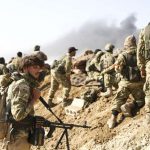Faced with an increasing number of COVID-19 cases, the disease caused by the new coronavirus, Turkey has put in place an array of measures.
It is confining citizens over 65 and under 20 years of age at home, closing road traffic in and out of some provinces and big cities, halting domestic flights until April 20, 2020, and international flights until May 20, providing free masks to the population, constructing two emergency hospitals in Istanbul, and imposing a curfew during weekends, starting with the weekend of April 11–12.
The efficiency of the first two-day curfew was somewhat tarnished by its announcement a mere two hours before its enforcement, provoking massive panic buying in large cities and hence an unwanted sanitary risk. Brief political turmoil ensued on April 12 with the resignation of the Turkish interior minister, promptly turned down by President Recep Tayyip Erdoğan, subsequently reigniting speculations over tensions within the presidential palace and the governing coalition.
Governance in Turkey has already been disrupted by the coronavirus.
The authorities are harassing news media reporting on the pandemic. As of April 7, more than 600 suspects sharing “unfounded and provocative social media messages” had been identified and 229 of them taken into custody. The authorities have also limited existing possibilities for the opposition-held municipalities of Istanbul and Ankara to raise funds to address the sanitary and economic emergency.
Another major concern lies in the penal system. Because 286,000 people are currently jailed in Turkey and coronavirus-related deaths have already occurred, the parliament on April 13 adopted a law meant to free some 90,000 inmates.
In principle, the early release of a large number of prisoners makes sense in a strategy to limit contamination. But the gesture is heavily biased since it excludes all prisoners of opinion, including elected people (such as Kurdish mayors), lawyers, journalists (such as Ahmet Altan), political opponents (such as Selahattin Demirtaş), or members of civil society (such as Osman Kavala).
The law was passed despite a flurry of reactions from official and civil society circles, both domestic and international.
Amnesty International called on Turkey’s government to “do the right thing and immediately release those who are imprisoned solely for expressing their peaceful views . . . [and] also seriously consider releasing all those who are imprisoned pending trial.”
On April 14, the main opposition Republican People’s Party announced it was challenging the law in the constitutional court.
Then there’s the pandemic-induced global recession, which comes on top of Turkey’s already dire economic situation and depleted foreign reserves.
According to the Moody’s rating agency, the pandemic could make the economic situation in Turkey even worse: “The risk of an acute balance-of-payments crisis has been magnified by the coronavirus outbreak, as illustrated by an acceleration in capital outflows and dwindling foreign exchange reserves.”
An agreement with the International Monetary Fund (IMF) on making use of its new coronavirus emergency measures—especially the Rapid Credit Facility and the Rapid Financing Instrument, which come with less conditions attached than the usual Stand-By Arrangements—would help. However, on April 13, Turkey’s president once again rejected striking an agreement with the IMF.
For the time being, Turkish measures are taken solely in a national context by the government, with additional efforts from public banks and a national donation campaign promoted by the authorities.
According to IMF estimates, the severe global recession will result in a loss in 2020 of around 7.5 percentage points of GDP in the eurozone and 6.5 percentage points in the UK, both of which are Turkey’s main exports markets and main sources of tourists. Turkey’s own GDP is forecast to contract by 5 percentage points.
In the medium-term, European demand for Turkey’s main exports—automobiles, household appliances, garments, and aerospace components—is likely to be sharply reduced. Turkey’s reliance on foreign direct investment and short-term finance from European sources will be affected by the EU’s need to relaunch domestic industries and by the reluctance to invest in a Turkey that continues to see a sharp degradation of its rule-of-law architecture.
As for the wider foreign policy implications of the pandemic, Turkey’s leadership sees it as an opportunity to project a positive image abroad. Already, it has provided material assistance to a number of countries including Italy, Kosovo, Serbia, Spain, members of the Turkic Council, and the United Kingdom.
On March 26, Erdoğan urged the G20 to help the most vulnerable people and countries during the global coronavirus pandemic, calling on “all the countries to take part in combating this global health crisis until the entire humanity breathes a sigh of relief.”
However, Turkey’s ability to be seen as a trusted international partner has recently been diminished by unilateral gestures such as a government-organized assault on the Greek border, a redefinition of maritime boundaries in the Eastern Mediterranean, and gas drilling in disputed areas around the island of Cyprus.
In Turkey, as almost everywhere else around the world, the post-pandemic short- and medium-term prospects are grim. But there are two areas where the pandemic offers Ankara an opportunity to amend policy choices and genuinely improve the country’s situation.
One is the early liberation of prisoners of opinion. This would help restore the country’s image in the West and would represent a goodwill gesture for future relations.
The other is to quickly make use of the special coronavirus-related financial facilities offered by the IMF. This would avoid having to discuss it later—and under more stringent terms.
But the likelihood of Turkey’s leadership adopting either of these measures is slim.



